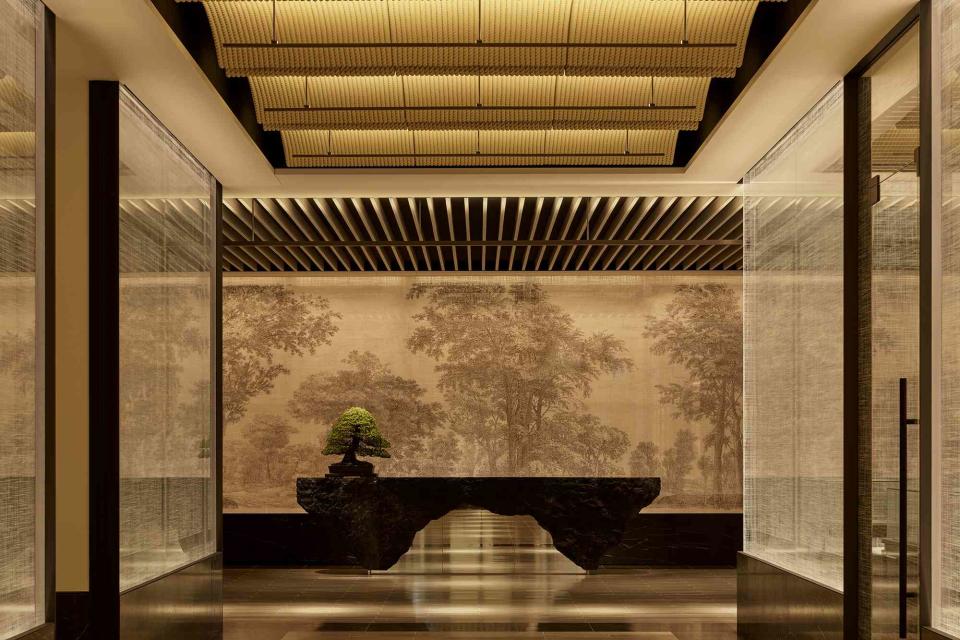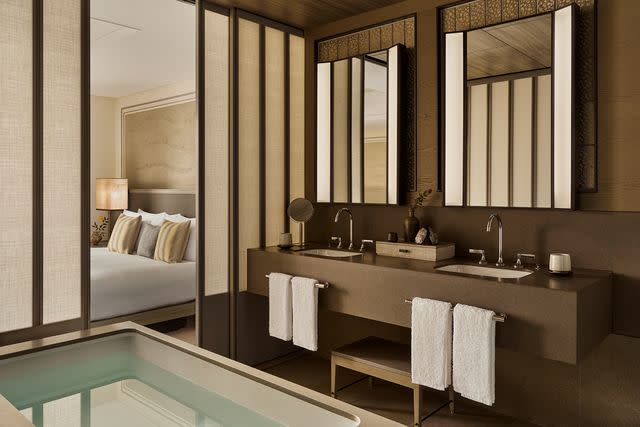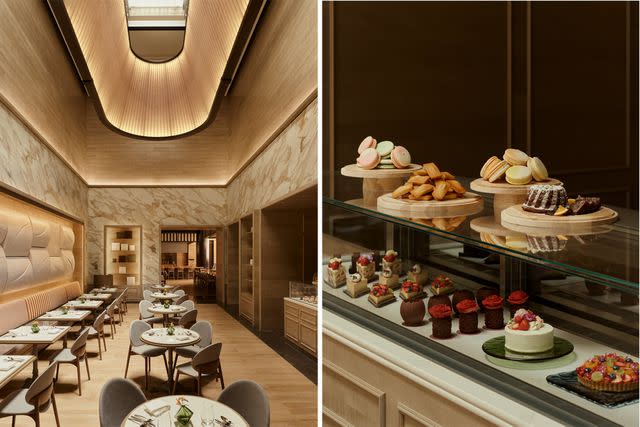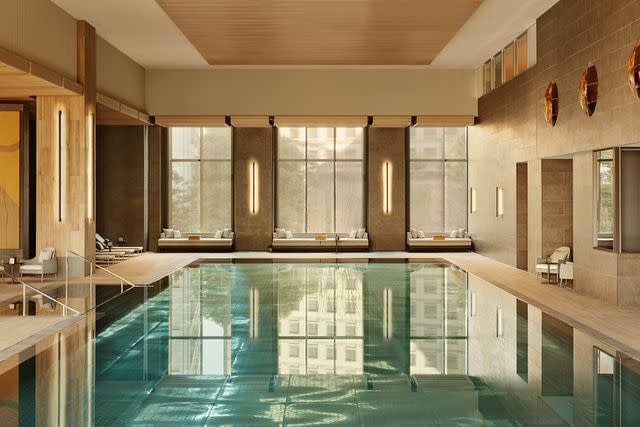Aman’s Sibling Brand Has Just Opened in Tokyo — and We Were One of the First to Stay
Described a more "energetic" take on the storied Aman brand, Janu Tokyo is the first of 12 Janu Hotels set to open worldwide.

Robert Rieger/Courtesy of Aman
You can't forget where you are when you arrive at the fifth-floor lobby of Janu Tokyo. Dominating the floor-to-ceiling view just past the reception desk rises the red and white framework of the Tokyo Tower. It’s a welcome connection to the city and a compliment to the quiet clink and buzz of afternoon tea around the corner.
This sense of connection is a core tenant for the newly opened Janu Tokyo, the much-anticipated flagship (and the first of 12 Janu hotels to open worldwide) of the sibling brand to Aman Resorts. While Aman Group is known for its highly privatized serenity, offering guests a remote, luxurious haven away from the world, its younger sibling leans more energetic and community-oriented. Janu Tokyo aims to maintain the Aman brand’s exceptional design and service and then turn guests’ focus outward by connecting them with the hotel’s expansive wellness facilities, numerous dining establishments across multiple floors, and options for connecting guest rooms and suites — all at a (slightly) more affordable price point.
Janu Tokyo, which takes up the first 13 floors of Residence A Tower, is the only hotel in the newly-opened Azabudai Hills, a dynamic neighborhood featuring green spaces designed by Thomas Heatherwick, the Mori JP Tower designed by Pelli Clarke & Partners, and a slew of high-end designer shops and residential buildings. The interiors, designed by Jean-Michel Gathy (creator of many Aman hotels), harken to its big sibling with an emphasis on an abundance of natural light and generous use of space with a thoughtful balance of Japanese minimalism and a youthful infusion of playful detailing. The resulting aesthetic offers a comfortably calm yet contemporary hub from which to explore the city.
The quick elevator ride up to my room offered another vantage point of the iconic tower and the gradients of landscaped gardens below, this time from the privacy of my own spacious balcony. I quickly plotted a new morning and evening routine — a cup of tea or apéro, respectively, in hand — before taking a quick elevator ride back down to the extensive spa and wellness center, which spans 43,000 square feet across four floors. Early for my treatment, I walked past the large fitness area to join a few other hotel guests moving through the sauna and cold plunge before being collected for my massage. Ninety minutes later, I’m out, a little more rested, and ready to reconnect to the world.
Here’s everything you need to know about Janu Tokyo.
Janu Tokyo
Most rooms come with a balcony, and even the smallest room at Janu Tokyo is generous in size and light-filled.
The fitness, spa, and wellness offerings are extensive, spotless, and easy to navigate despite the size of the facilities.
The on-site food and beverage offerings offer plenty of choices in menu items and vibe.
A quick walk from the hotel lands you at Kamiyachō (Hibiya Line) and Roppongi-Itchome (Namboku Line) metro stations, making it an easy base from which to explore the city.
The Rooms

Robert Rieger/Courtesy of Aman
There are 122 guest rooms (41 of which are suites) spanning from floors six to 13, the smallest of which — small being used loosely here — starts at 592 square feet. Most rooms come with a private balcony, and views range from the city skyline, the gardens of Azabudai Hills, or the iconic Tokyo Tower. Many also connect to neighboring rooms, a welcome option when traveling with a larger group or family.
The City Room my partner and I stayed in featured a calming palette of creams and greys, an integrated sitting area, 12th-floor balcony views of the aforementioned landmark Tokyo Tower, and a deep soaking tub — spacious enough for two and separated from the bedroom via sliding doors inspired by Japanese shoji screens. A long soak paired with a cup of green tea (specially blended for Janu and found alongside the in-room assortment of refreshments) is the ideal start or end to a day in the city. I especially appreciated the dish of pink rock salt (refilled the following morning for the next day’s soak). If you’re also a bath lover, book any room you like: all enjoy bathtubs in a variety of layouts (including some with outdoor views) as well as double vanities, rain showers, and automated Toto toilets equipped with heated seats. The large floor-to-ceiling windows are layered with multiple screens — from sheer to blackout and conveniently controllable from bed — allowing you to choose whether to flood the room with natural light. Should you choose the latter, the dimmable lighting throughout feels luxurious.
The Janu Suite, at 3,057 square feet, is the hotel’s largest, featuring a separate living space, a private study, a kitchen with a dining room table for six, two generous balconies (dual views of Tokyo Tower and the Azabudai Hills Garden) and an additional guest powder room. It can connect seamlessly to three additional rooms, expanding its private footprint to 5,586 square feet.
Food and Drink
Janu’s seven restaurants and one bar are spread across multiple floors and draw guests from the hotel and the surrounding neighborhood alike. Ask the concierge to make a reservation for you to ensure a seat and start with a drink at the eponymous fifth-floor bar. I especially enjoyed the Bright Bran made with cognac, mandarin gin, amaro, and tonic water, but if gin isn’t your thing, you really can’t go wrong — the menu, inspired by the distinct prefectures of Tokyo, is designed by Shuzo Nagumo, one of Japan’s leading bartenders. Try The Crown, a shochu, vodka, and sauternes combination inspired by Shinjuku, or the Savoury Fashioned, a beef fat-washed bourbon inspired by the Ningyocho district.

Robert Rieger/Courtesy of Aman
Also on the fifth floor is Hu Jing, Janu Tokyo’s sprawling Cantonese restaurant featuring Peking duck, dim sum, and natural wine, which serves lunch and dinner. For a steak (and an extensive wine cellar), head down a floor to Janu Grill and choose from a comprehensive list of cuts from Japan and options from Argentina and New Zealand. Janu Grill is also where à la carte breakfast is served to hotel guests if you choose not to have your morning meal delivered straight to your room.
Another floor down is Sumi, Janu’s small, modern take on a sumibiyaki restaurant centered around a charcoal grill. The omakase menu features Kuroge Wagyu beef, sea bream, and rockfish. Be sure to request one of the seven counter seats and marvel at the precise preparation of the sashimi at Iigura, an intimate omakase experience featuring Edomae-style sushi on the second floor. The Italian-focused Janu Mercato and the Janu Patisserie lie on the street level (where you’ll also find taxi and car service, two Aman Essentials boutiques, and the elevators up to the lobby).
Should afternoon tea be more your thing, the Janu Lounge and Garden Terrace, just past the fifth-floor reception, is a perfect afternoon pick-me-up. The signature Janu black and green teas are a delight — sourced from Okinawa Tea Factory and SABOE and exclusively blended for Janu.
Experiences and Amenities

Robert Rieger/Courtesy of Aman
Janu Tokyo is committed to wellness from the physical to the spiritual (indeed, the hotel’s name is derived from the Sanskrit word for “soul”), and the 43,000 square-foot spa and wellness center is a highlight of a stay at the property. Extending across four floors, it includes a large gym with floor-to-ceiling views on three sides, a range of TechnoGym equipment, and five dedicated movement studios for group or private sessions, including spinning, yoga, boxing, and golf simulation.
There’s also an impressive 82-foot indoor lap pool, heated lounge pool, hydrotherapy, and thermal areas separated by gender and featuring cold plunge, Japanese baths, and steam rooms. Should you prefer to privatize your wellness experience for up to four guests, book one of two signature Spa Houses. The exclusivity comes with double treatment rooms, spacious relaxation areas, hydrotherapy facilities including cold plunge and hot bath, and the choice between Banya (a wood-lined sauna with Vichy shower) or Hammam (a steam room with a large heated marble treatment table at its center). All are designed in the Janu Tokyo’s clean lines and tranquil aesthetic.
There is also a hair and nail salon and seven private treatment rooms. During my stay, I spent a restful 90 minutes enjoying the Janu Signature Massage, which incorporates Aman skincare oils, manual lymphatic drainage massage, Kansa alkaline copper bars to regulate the skin’s pH and a copper comb scalp massage.
Accessibility
There are wide doorways and hallways, and multiple large elevators connect every floor throughout the property. Janu Tokyo offers three accessible rooms: 6F, 7F, and 8F, all of which are Premier Rooms featuring king beds, spacious showers, and grab bars in the bathrooms. All restaurants and bars at the resort are ADA-compliant. There is a lift to get to the sixth-floor Spa House, and some areas in the wellness center are accessible, including the gym, treatment rooms, and changing rooms; however, the bath facilities have limited space and several steps.
Location
Centered in the heart of Tokyo’s Azabudai Hills development and surrounded by the urban village’s elevated stores—Cartier, Dior, and Hermès all have outposts. It took us 15 quick minutes to arrive by car from the train station — though our driver mentioned that the same drive can take up to 25 minutes with Tokyo's traffic. From the airport, Janu Tokyo is only 30 minutes from Haneda International Airport and 90 minutes by car from Narita International Airport. A quick walk from the hotel lands you at Kamiyachō (Hibiya Line) and Roppongi-Itchome (Namboku Line) metro stations, making it an easy base from which to explore the city.
How to Get the Most Value Out of Your Stay
Low-season rooms start at $944 a night. Upon checkout, take a piece of Janu Tokyo with you on your next stop with a branded luggage tag, thoughtfully attached to your suitcase.
For more Travel & Leisure news, make sure to sign up for our newsletter!
Read the original article on Travel & Leisure.

